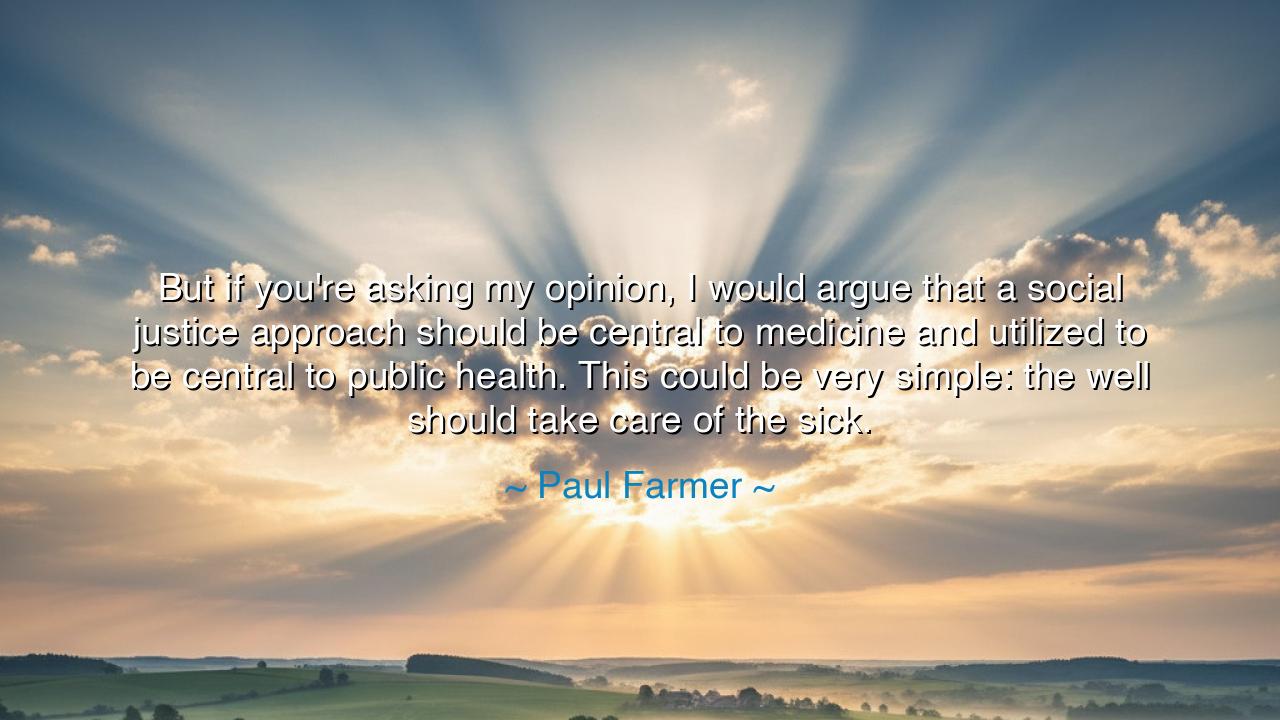
But if you're asking my opinion, I would argue that a social
But if you're asking my opinion, I would argue that a social justice approach should be central to medicine and utilized to be central to public health. This could be very simple: the well should take care of the sick.






In the words of Paul Farmer, healer of nations and friend of the forgotten, there lies a truth both ancient and revolutionary: *“But if you’re asking my opinion, I would argue that a social justice approach should be central to medicine and utilized to be central to public health. This could be very simple: the *well should take care of the sick.” These words are not merely advice for physicians—they are a summons to humanity itself. They call upon the moral law that has guided the just since time began: that those with strength must lift those in weakness, and that true civilization is measured not by wealth, but by compassion.
Paul Farmer spoke these words not from a throne, but from the fields of suffering. He labored among the mountains of Haiti, where disease walked hand in hand with poverty. There he saw that medicine, without justice, is a body without a soul. He watched as the poor died of illnesses long cured in the richer lands—treatable, preventable, yet left to fester because compassion had been replaced by calculation. And so, from those places of despair, Farmer forged his creed: that medicine must be an instrument of justice, that healing must not end at the hospital door, and that the health of one depends upon the health of all.
The ancients would have called this idea divine. For even in the oldest wisdoms of humankind, the duty of the strong toward the weak was sacred. In the temples of Egypt, the physicians of the Pharaoh were commanded to treat the slave as they would the prince. In the stories of the Buddha, compassion was the highest medicine, capable of curing both body and spirit. Farmer’s words are an echo of this timeless teaching—that health is not a privilege, but a shared inheritance, bestowed upon every living soul.
Consider the story of the plague doctors in the time of the Black Death. While others fled the cities, these few remained, tending to the dying though they knew death lurked in every breath. Some did it for faith, others for duty—but among them were those who believed, as Farmer did, that the well must care for the sick, for in doing so, they preserved the light of humanity amid the world’s darkness. They were not merely healers of disease, but guardians of conscience. For when fear rules the heart and compassion fades, civilization itself begins to rot.
In our modern age, we are tempted to believe that medicine is the work of specialists alone, of hospitals, policies, and machines. But Farmer’s words remind us that the heart of healing is relationship—one human caring for another. The “social justice approach” is not abstract theory; it is the practice of love in action. It is the belief that the health of the rich man depends upon the health of the poor man, that clean water, education, and dignity are as vital as any drug. In this way, public health becomes not merely a science, but a covenant between souls.
The message of Farmer’s life is simple, yet immense: to heal is to serve. He built hospitals where none existed, trained doctors who would serve their own people, and refused to accept the lie that some lives are worth less than others. He taught that compassion is the most powerful medicine, and that justice must be written into every prescription, every policy, every act of care. In this, he became a bridge between ancient virtue and modern science—a reminder that the future of medicine lies not in technology alone, but in the moral awakening of those who wield it.
Let those who hear this teaching take it into their hearts. You need not be a doctor to practice the art of healing. Whenever you feed the hungry, visit the lonely, or stand against injustice, you are living this creed—that the well must care for the sick, that those who have must give, that those who can must act. In this lies the secret strength of humankind: not dominance, but compassion; not conquest, but care.
And so, the lesson endures: Justice is the truest medicine, and love its most potent cure. Let each of us, in our homes, our work, and our nations, strive to be physicians of the soul—to see suffering and respond, not with pity, but with purpose. For in the end, the measure of a people is not how they celebrate the strong, but how they heal the broken, how they lift the fallen, and how they cherish the sick. Then, and only then, will humanity itself be well.






AAdministratorAdministrator
Welcome, honored guests. Please leave a comment, we will respond soon